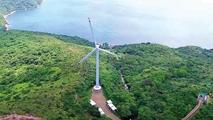 This undated photo shows a wind turbine on Lamma Island, Hong Kong. (PHOTO PROVIDED TO CHINA DAILY)
This undated photo shows a wind turbine on Lamma Island, Hong Kong. (PHOTO PROVIDED TO CHINA DAILY)
HONG KONG – The Hong Kong government announced on Friday the "Hong Kong's Climate Action Plan 2050," outlining the strategies and targets for combating climate change and achieving carbon neutrality.
The action plan, announced by Secretary for the Environment Wong Kam-sing, sets out the vision of "Zero-carbon Emissions‧Liveable City‧Sustainable Development".
"Achieving carbon neutrality before 2050 is extremely challenging and requires the participation of the whole community,” Wong said in a statement, urging the public to practice a low-carbon lifestyle.
The "Hong Kong's Climate Action Plan 2050" outlines four major decarbonization strategies and measures, namely net-zero electricity generation, energy saving and green buildings, green transport and waste reduction
The new plan outlines four major decarbonization strategies and measures, namely net-zero electricity generation, energy saving and green buildings, green transport and waste reduction.
In the next 15 to 20 years, the government will devote about HK$240 billion to take forward various measures on climate change mitigation and adaptation, according to the statement.
ALSO READ: Net-zero carbon emissions by 2050?
The Environment Bureau will set up a new Office of Climate Change and Carbon Neutrality to strengthen coordination and promote deep decarbonization. In addition, a dedicated advisory committee on combating climate change will also be formed to encourage different the community to participate in climate actions, according to the statement.
"Combating climate change is a long-term task that requires unwavering efforts. We will, in line with the spirit of the Paris Agreement, conduct a review about every five years to keep up with the times," Wong said.
In response to the Paris Agreement, the government announced Hong Kong's Climate Action Plan 2030+ in 2017. The plan set out a target of cutting the city’s carbon intensity by 65 percent to 70 percent by 2030 from 2005's target, which is equivalent to a reduction in total carbon emissions by 26 percent to 36 percent.
Hong Kong is moving steadily towards the 2030 decarbonization target, the government said, noting that the city’s carbon intensity in 2019 was about 35 percent lower than that in 2005.
In 2019, electricity generation was Hong Kong's largest source of carbon emissions (66 percent), followed by transport (18 percent) and waste (7 percent), according to Wong.
READ MORE: HK ramps up action plans to develop green financing hub
Last year, Chief Executive Carrie Lam Cheng Yuet-ngor announced in her Policy Address that Hong Kong would strive to achieve carbon neutrality before 2050.
To achieve that target, Lam said in her annual address on Wednesday that the new action plan would set out more proactive strategies and measures on reducing carbon emissions, and pursue more vigorous interim decarbonization targets to reduce Hong Kong's carbon emissions by 50 percent before 2035.


